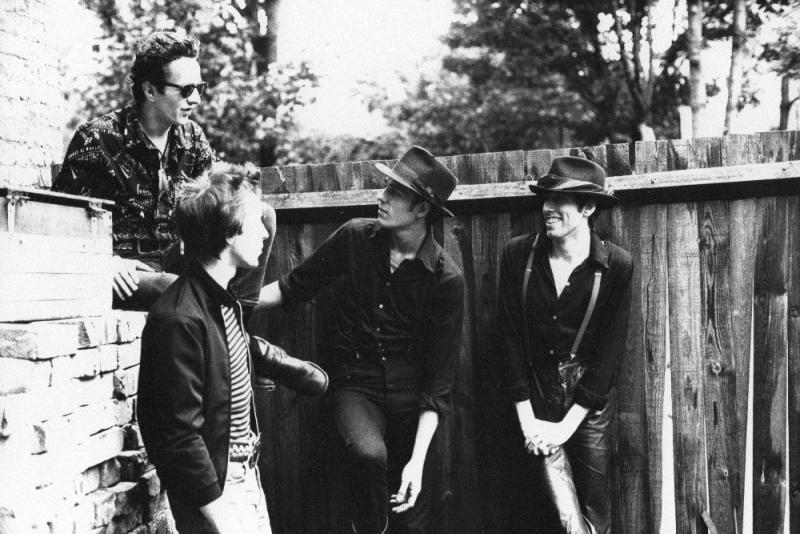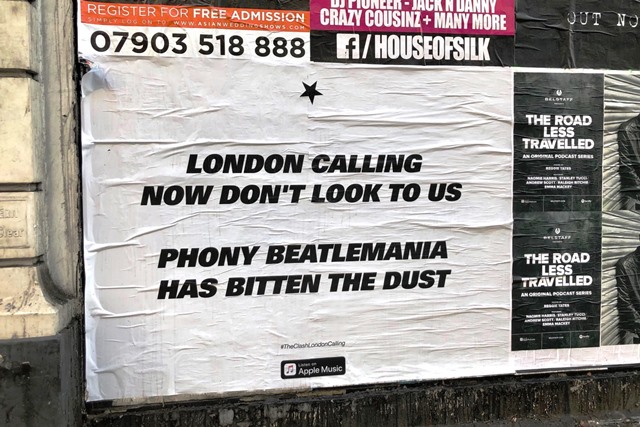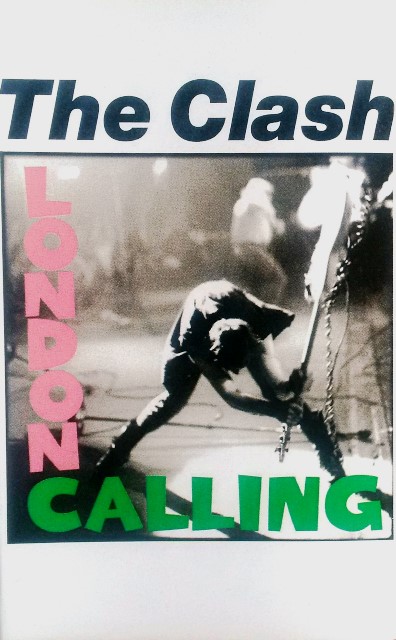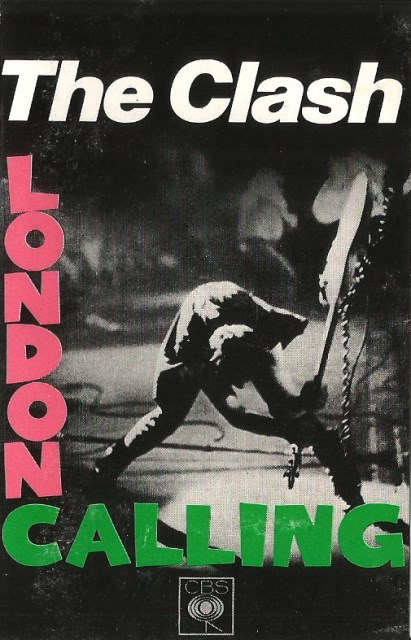Reissue CDs Weekly: The Clash - London Calling | reviews, news & interviews
Reissue CDs Weekly: The Clash - London Calling
Reissue CDs Weekly: The Clash - London Calling
The cassette rematerialises for the 40th anniversary of Strummer and co’s breakthrough double album

In a first for this column, what’s cropping up is a cassette reissue. The Clash’s third album is so familiar, going into what it is or was in any depth is redundant but it’s worth considering what’s going on here.
London Calling was originally issued on 14 December 1979 and is celebrating its 40th anniversary. Naturally, it’s hitting the shops again. The definitive reissue came out for the 25th anniversary in 2004, when the album was teamed with rehearsal recordings taped on cassette at Vanilla Studios, a DVD of The Last Testament: The Making of London Calling documentary, promo videos, film of a few tracks performed live and footage of the band making the album at Wessex Studios with producer Guy Stevens. Since the 2004 reissue, there have been various vinyl reissues and, in 2013, a double-CD remaster limited to the original album tracks only.
 What to do to mark 40 years since 1979? That something is going on is confirmed by a flyposting campaign: a poster currently ornaments London’s Great Portland Street (pictured right). Inevitably, there’s yet another vinyl reissue (in a plastic sleeve with the typography on it: slide it off and you’re left with the Paul Simonon image only – it's promoted as a "limited edition", but no information on how many copies have been manufactured has been given) and a double CD too. There is also what’s titled the London Calling Scrapbook, a hardback book including the whole of the album on one CD (this is gone into below). There is also a cassette version of London Calling (another "limited edition" of an unspecified quantity).
What to do to mark 40 years since 1979? That something is going on is confirmed by a flyposting campaign: a poster currently ornaments London’s Great Portland Street (pictured right). Inevitably, there’s yet another vinyl reissue (in a plastic sleeve with the typography on it: slide it off and you’re left with the Paul Simonon image only – it's promoted as a "limited edition", but no information on how many copies have been manufactured has been given) and a double CD too. There is also what’s titled the London Calling Scrapbook, a hardback book including the whole of the album on one CD (this is gone into below). There is also a cassette version of London Calling (another "limited edition" of an unspecified quantity).
Selling for around £18, the cassette (pictured below left) will not be a casual purchase (NB: the 2004 multi-disc reissue can be picked up for £6 or £7). The album was issued on cassette in 1979 and the new version has a pretty inelegant re-rendering of the cover artwork (pictured below right, the 1979 cassette original). That said, having each tape-shell half in the green and pink of album’s front-cover typography is snazzy. Then, there is the question of what it sounds like.
 Handily, a recent purchase is of a TEAC W-1200, one of the two affordable cassette decks currently available on sell-through (the other is a TEAC too). Walkman-like players, boom-box efforts (the best of which is the Sony CFDS70B.CEK), some music centre-style kit and the odd shoebox machine can be found, but TEAC is the only company making cassette players for use in a home hi-fi setting. Thus, the new iteration of London Calling becomes the first reissue stuck into it for playback.
Handily, a recent purchase is of a TEAC W-1200, one of the two affordable cassette decks currently available on sell-through (the other is a TEAC too). Walkman-like players, boom-box efforts (the best of which is the Sony CFDS70B.CEK), some music centre-style kit and the odd shoebox machine can be found, but TEAC is the only company making cassette players for use in a home hi-fi setting. Thus, the new iteration of London Calling becomes the first reissue stuck into it for playback.
Unexpectedly, it sounds great. How it was mastered and what the audio source is are unknown but, presumably, a digital master was used (if anyone has the 1979 cassette please get in touch, it’d be interesting to hear it). Side One and Two of the album make up Side One of the cassette; Sides Three and Four are on Side Two. There’s a little bit of background hiss at the beginning but once “London Calling” kicks off the sound is unambiguously not that of a CD (and way more punchy than the awful, decoagulated approach taken for the Clash on Broadway box). What comes out of the speakers is close to the original single, with an attractive compression which sounds suitably 1979. It’s the same throughout the album. The levels have a top end hitting 0db, with no distortion and almost no run-over into the red. So, more compressed than the original album but with a digital-era clarity. “Hateful” sounds especially great. But, really, who is going to buy this?
As it sells for £40, the same question applies to the London Calling Scrapbook. This is a lot for a 120-page hardback/CD combo package, even if it does come in a slipcase. While neat, and featuring reproductions of hand-written lyrics and notes, material from Ray Lowry, paper ephemera, photos, press coverage (including Joe Strummer’s funny and shrewd NME tour diary) this seems a high price. £20 feels about right. Again, it's a so-called "limited edition." Without a specific figure, this is meaningless. Are there 500 copies? Or 10,000? Half a million? Is it manfactured until sales dry up?
 Amongst the London Calling Scrapbook's press clippings is a September 1979 Minneapolis Star live review headlined “Clash concert intriguing but hardly transcendental.” The piece begins by quoting reviews from the days before declaring The Clash had played “the best rock show most people had ever seen” and were “the most intense band ever.” While consciously kicking against the already bedded-in hyperbole/orthodoxy, it’s a thought-provoking read. “Once [Strummer] turned the lead vocals over to lead guitarist Mick Jones, the Clash finally began to click. Listeners began to realize this band was talented and well conceived, not just a garage band that manically banged out intense rudimentary rock ’n’ roll. Few can deny that the quartet is a great dance band.”. Another review, of a New York show, says “the crowd was this year's model: rich punks and metal boys form the outer boroughs looking for band to get high to.” Fascinating stuff, but none of it adds to or alters how the band’s seen.
Amongst the London Calling Scrapbook's press clippings is a September 1979 Minneapolis Star live review headlined “Clash concert intriguing but hardly transcendental.” The piece begins by quoting reviews from the days before declaring The Clash had played “the best rock show most people had ever seen” and were “the most intense band ever.” While consciously kicking against the already bedded-in hyperbole/orthodoxy, it’s a thought-provoking read. “Once [Strummer] turned the lead vocals over to lead guitarist Mick Jones, the Clash finally began to click. Listeners began to realize this band was talented and well conceived, not just a garage band that manically banged out intense rudimentary rock ’n’ roll. Few can deny that the quartet is a great dance band.”. Another review, of a New York show, says “the crowd was this year's model: rich punks and metal boys form the outer boroughs looking for band to get high to.” Fascinating stuff, but none of it adds to or alters how the band’s seen.
Anniversaries of course provide opportunities for promotion and, in this context, The Clash will never be exempt from such restatements. After the band signed with CBS in 1977 their corporate, multi-national paymasters were always going to be looking for returns on their investment and any accusations of “turning rebellion into money,” as the lyrics of “White Man in Hammersmith Palais” put it, were accentuated in 1991 by the use of “Should I Say or Should I Go” for a Levi’s ad. The 40th anniversary was always going to be marked somehow.
As appealing as the cassette and the London Calling Scrapbook are, reservations about them centre on them not as a means to turn coin but whether they say anything new and represent value for money. Neither do either.
- Next week: At a Point Between Fate and Destiny The Complete Recordings – Brit-freaks Mighty Baby in a box
- Read more reissue reviews on theartsdesk
- Kieron Tyler’s website
Explore topics
Share this article
The future of Arts Journalism
You can stop theartsdesk.com closing!
We urgently need financing to survive. Our fundraising drive has thus far raised £49,000 but we need to reach £100,000 or we will be forced to close. Please contribute here: https://gofund.me/c3f6033d
And if you can forward this information to anyone who might assist, we’d be grateful.

Subscribe to theartsdesk.com
Thank you for continuing to read our work on theartsdesk.com. For unlimited access to every article in its entirety, including our archive of more than 15,000 pieces, we're asking for £5 per month or £40 per year. We feel it's a very good deal, and hope you do too.
To take a subscription now simply click here.
And if you're looking for that extra gift for a friend or family member, why not treat them to a theartsdesk.com gift subscription?
more New music
 Music Reissues Weekly: Joe Meek - A Curious Mind
How the maverick Sixties producer’s preoccupations influenced his creations
Music Reissues Weekly: Joe Meek - A Curious Mind
How the maverick Sixties producer’s preoccupations influenced his creations
 Pop Will Eat Itself, O2 Institute, Birmingham review - Poppies are back on patrol
PWEI hit home turf and blow the place up
Pop Will Eat Itself, O2 Institute, Birmingham review - Poppies are back on patrol
PWEI hit home turf and blow the place up
 'Fevereaten' sees gothic punk-metallers Witch Fever revel in atmospheric paganist raging
Second album from heavy-riffing quartet expands sonically on their debut
'Fevereaten' sees gothic punk-metallers Witch Fever revel in atmospheric paganist raging
Second album from heavy-riffing quartet expands sonically on their debut
 theartsdesk Q&A: Soft Cell
Upon the untimely passing of Dave Ball we revisit our September 2018 Soft Cell interview
theartsdesk Q&A: Soft Cell
Upon the untimely passing of Dave Ball we revisit our September 2018 Soft Cell interview
 Demi Lovato's ninth album, 'It's Not That Deep', goes for a frolic on the dancefloor
US pop icon's latest is full of unpretentious pop-club bangers
Demi Lovato's ninth album, 'It's Not That Deep', goes for a frolic on the dancefloor
US pop icon's latest is full of unpretentious pop-club bangers
 Yazmin Lacey confirms her place in a vital soul movement with 'Teal Dreams'
Intimacy and rich poetry on UK soul star's second LP
Yazmin Lacey confirms her place in a vital soul movement with 'Teal Dreams'
Intimacy and rich poetry on UK soul star's second LP
 Solar Eyes, Hare & Hounds, Birmingham review - local lads lay down some new tunes for a home crowd
Psychedelic indie dance music marinated in swirling dry ice
Solar Eyes, Hare & Hounds, Birmingham review - local lads lay down some new tunes for a home crowd
Psychedelic indie dance music marinated in swirling dry ice
 The Lemonheads' 'Love Chant' is a fine return to form
Evan Dando finally gets back in the saddle with an album of new tunes
The Lemonheads' 'Love Chant' is a fine return to form
Evan Dando finally gets back in the saddle with an album of new tunes
 Music Reissues Weekly: Evie Sands - I Can’t Let Go
Diligent, treasure-packed tribute to one of Sixties’ America’s great vocal stylists
Music Reissues Weekly: Evie Sands - I Can’t Let Go
Diligent, treasure-packed tribute to one of Sixties’ America’s great vocal stylists
 'Deadbeat': Tame Impala's downbeat rave-inspired latest
Fifth album from Australian project grooves but falls flat
'Deadbeat': Tame Impala's downbeat rave-inspired latest
Fifth album from Australian project grooves but falls flat
 Heartbreak and soaring beauty on Chrissie Hynde & Pals' Duets Special
The great Pretender at her most romantic and on the form of her life
Heartbreak and soaring beauty on Chrissie Hynde & Pals' Duets Special
The great Pretender at her most romantic and on the form of her life
 The Last Dinner Party's 'From the Pyre' is as enjoyable as it is over-the-top
Musically sophisticated five-piece ramp up the excesses but remain contagiously pop
The Last Dinner Party's 'From the Pyre' is as enjoyable as it is over-the-top
Musically sophisticated five-piece ramp up the excesses but remain contagiously pop

Add comment